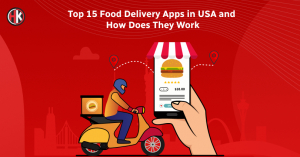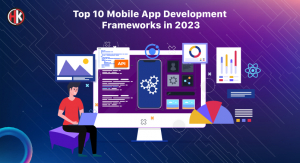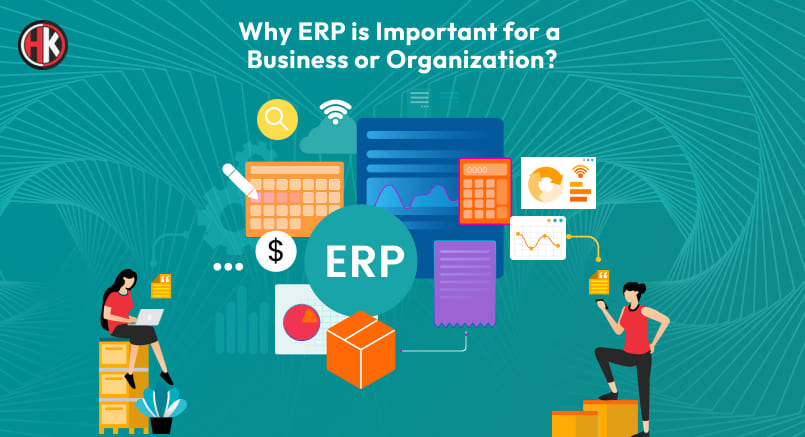
ERP is a suite of software applications that manage all aspects of an organization’s resource allocation and reallocation. These systems help companies to run their operations more efficiently, including sales, marketing, human resources, financial planning, and accounting.
And because ERP pulls together data from disparate sources in one place, it can provide users with real-time information about their business. The results are better decision-making and improved operational efficiency.
Due to the close ties between manufacturing and enterprise planning software’s origins, there are reliable manufacturing ERP solutions available that serve a variety of niche markets. Many different industries use ERP software systems, which are essential to many of them, including but not limited to:
- Aerospace and Defense industry
- Agribusiness, Farming, and Agriculture
- Healthcare and Hospitality
- Clothing, Consumer Goods, and Retail
- Food and Beverage
- Manufacturing Industry
- Industrial Machinery and Components
- Healthcare Industry, Pharmaceutical, and Life Sciences
- Construction and Home Improvement
- Electronics and Technology
- Automotive Industry
Table of Contents
What is ERP?
ERP stands for Enterprise Resource Planning. It is software that helps businesses to organize their data and operations. It helps companies to manage their resources, information, and people. This software is used by all kinds of businesses—from small to large—and it can be used to automate many things that were previously done manually.
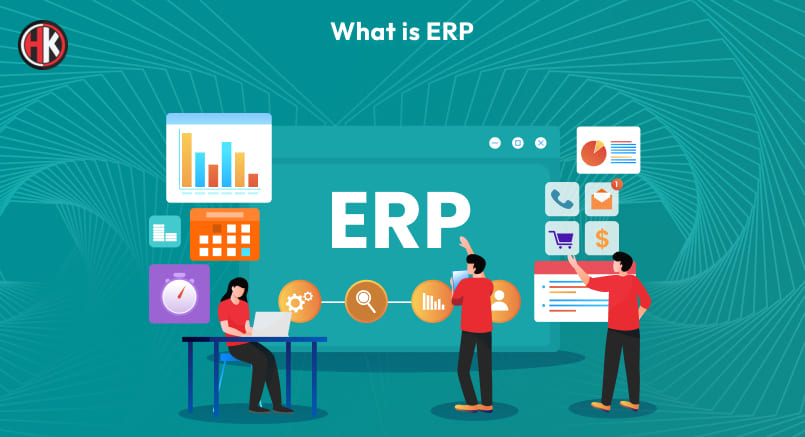
This software is designed to help companies with their daily management tasks such as sales, marketing, and finance while also providing them with tools for improving efficiency through improved reporting capabilities (e.g., inventory tracking), financial analysis (e.g., budgeting & forecasting), human resource management (e.g.., employee time sheets), supply chain management (e.g.., tracking orders).
What are the Types of ERP systems?
There are three primary types of Enterprise resource planning systems, each of which has a variety of deployment models. The three most popular types of systems are hybrid systems, on-premise systems, and cloud-based systems.
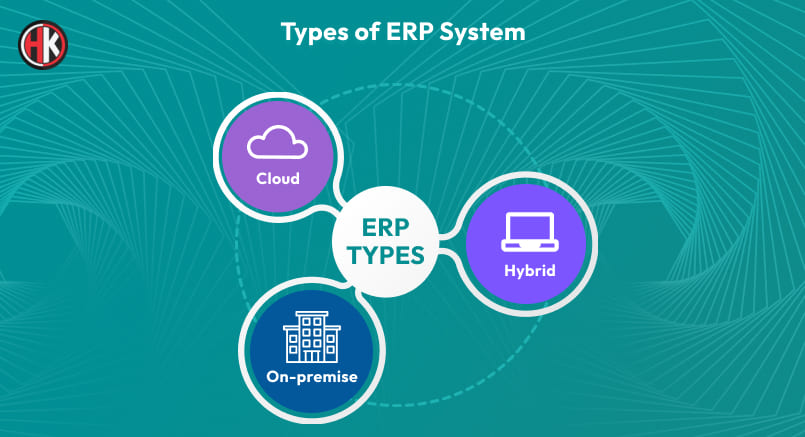
On-premise ERP Systems:
For complete control, support, and ownership of the entire system once implemented, an on-premise ERP program is implemented onsite and maintained in actual office space within an organization. It is hosted on the company’s own computers and servers.
Examples: Cetec, Epicor Kinetic, etc.
Cloud-based ERP systems:
An organization can access and store data on any device connected to the internet using cloud-based ERP software, a web-based solution called SaaS (Software as a service)
This is typically accomplished through the payment of a subscription. Updates, training, support, and flexible customizations are always supported by the software-providing company.
Examples: Oracle ERP Cloud, NetSuite, etc.
Hybrid ERP system:
Enterprise resource planning software that combines on-premises and cloud-based deployment is referred to as hybrid software. Each provider has a different hosting and deployment service combination.
These models can offer ERP users the freedom to switch between delivery methodologies and utilize benefits not present in the current implementation.
Example: NetSuite
Read More:- UI and UX: What are the Differences and Similarities?
Top 10 reasons Why ERP is Important for a Business
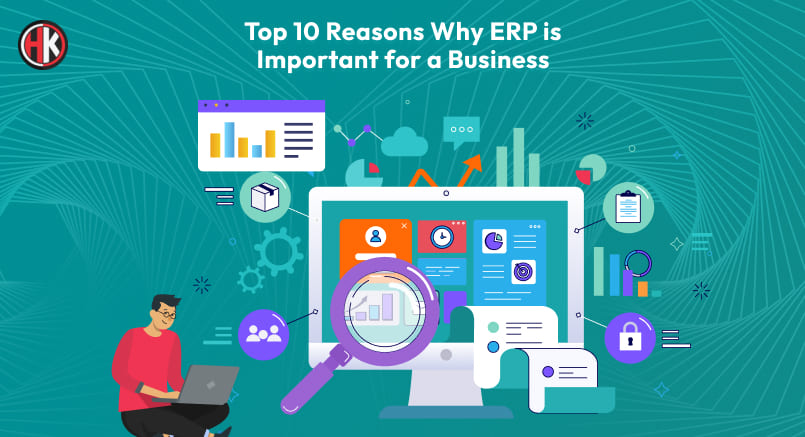
1. Data Security:
Because data is so important to making the best decisions possible, it has become a valuable asset for businesses, and Enterprise resource planning solutions can effectively protect that asset.
The level of security is increased by the fact that all of this data is in one location as opposed to being spread among various systems with differing levels of security.t takes the place of the Excel spreadsheet and other documents that are currently stored on employees’ desktops and distributed via email.
Your data is typically spread across several remote servers with a cloud ERP system to create duplicative information and guard against a singular point of failure, introducing one more layer of security. This is especially crucial if your business deals with a lot of private customer information.
2. Improved Management Efficiency
All aspects of business operations that require management, such as production, sales, human resources, inventory, customer support, and supply, are connected by means of ERP solutions, which act as a data center.
This software enables automated data processing in the fastest and most effective manner with the aid of computer technologies.
Enterprise resource planning solutions significantly reduce paperwork and the need for data entry by hand. This advantage leads to a significantly lower probability of errors that can disturb the flow of production.
3. Increased Information Availability and Accuracy
Modern Enterprise resource planning systems make it possible to efficiently and centrally gather, process, and store data about production, sales, supplies, or customers.
As a result, only one data system needs to be used and maintained instead of numerous separate databases that require regular checks and coordination to remove records that are outdated or redundant. This makes sure that all information is readily available when needed.
An extremely valuable achievement that further optimizes performance at all levels of the business is the improved quality of all types of internal data and its simple accessibility to the employees in any relevant department.
The task that receives the greatest benefit from the ERP application is distribution network and inventory management in particular.
4. Better Coordination
The collaboration between business branches or departments is enhanced by the centralized system that holds all data related to business.
By reducing communication lags throughout the entire organization, ERP software increases productivity. This is particularly a benefit if a business has a dispersed network of affiliates in numerous states or even on various continents.
5. Better and Accurate planning
The easy accessibility to the majority of business data enables easy analysis for the purpose of following a future development path. The management team and business analysts of the company can more successfully develop strategies or suggest adjustments to the current ones using the aggregated data.
6. Better reports
ERP software provides a convenient environment for quick and easy submission of all types of reports, from finance to warehouse, from customer behavior to repair and maintenance, etc. This is due to reduced paperwork and improved departmental communication.
7. Scalability and Adaptability
The modular design of ERP software, which enables scaling it up or down based on demands and conditions, is another obvious advantage. This characteristic enables resource planning to easily adjust to company growth or decrease on every level.
The appearance of new products, employees, manufacturing facilities, suppliers, departments, etc., as well as other seemingly insignificant changes to the company’s structure and operations, call for highly flexible ERP solutions.
ERP systems are capable of handling a variety of changes, including production expansion, inventory expansion, and the introduction of new functions, services, and users.
8. Cost-effective
ERP systems help lower administrative costs by reducing paperwork, streamlining daily tasks, and – most importantly – eliminating repetitive work.
Additionally, business processes like logistics, stock, supply chain management, and others that require a variety of data requests and approvals are greatly accelerated by resource planning solutions.
9. Extra easy-to-access management system
Enterprise Resource Planning (ERP) systems may be applied as mobile and web applications improved with cloud technologies depending on the particular needs. They can then be accessed anytime and from just about anywhere and run on mobile phones, computers, or other portable devices.
10. Improved customer support
The improvement of customer service is a further useful advantage of modern Enterprise Resource Planning software.
All necessary data on sales and customers are gathered in a single location, making it simpler for sales managers and customer service representatives to communicate with customers and shortening the time it takes to respond to their requests.
Additional advantages to the ones already mentioned include quicker and more accurate access to customer histories.
For instance, carefully gathering and analyzing information about customer patterns of behavior may result in better strategy optimizations or more accurate forecasts of supply that must be met appropriately and on schedule.
This final benefit is actually a compilation of all the earlier benefits but from the standpoint of business profits. The critical point is that ERP systems provide the business with the crucial competitive edge it needs to outperform its competitors.
Most businesses continue to use tried-and-true techniques but also invest in technological advancements and profit from them.
Read More:- How to Hire Remote Developers in the USA for your Project in 2023
When is Enterprise Resource Planning needed for an Organization?
Although it is recommended for all businesses or organizations to have an ERP system, it becomes a crucial necessity in the following cases:
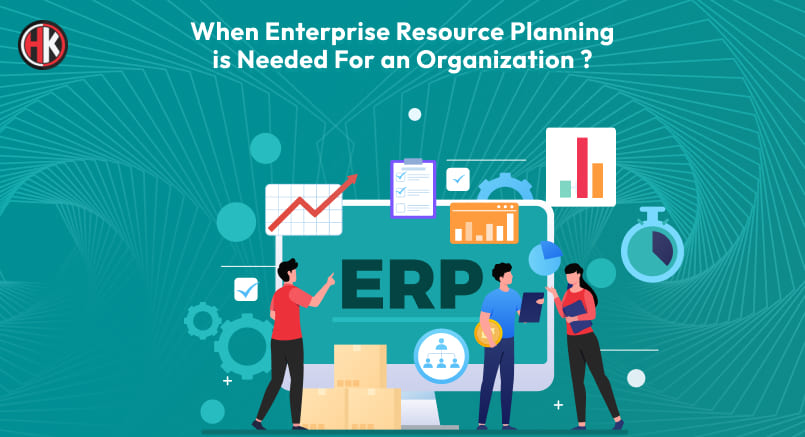
1. When the Company grows
When you have a growing organization, it’s time to consider ERP. The growth of your company may be as simple as hiring additional employees or adding new products and services. In addition, your organization may need multiple locations around the world that need to be managed its customers efficiently.
ERP systems can help with these challenges by helping you manage all of these tasks at once through a single platform.
2. When New work locations are added
When you add new work locations to your company, it’s important that you have a system in place that can help manage all of these locations.
An ERP system will allow you to track inventory and sales data across multiple sites, making it easier for employees at each location to know where supplies are and how much they have on hand. In addition, an ERP system will give managers insight into how well their employees are doing at each location.
This allows them to make decisions based on hard data rather than just unreliable evidence—and if there are problems with certain stores or departments within an area (or even within one store), it makes sense for managers at those sites as well as anyone else who might be affected by such issues (including customers)
3. When the Company Starts Offering More Services or Products:
When a company offers more services or products, its business model changes. In this case, Enterprise Resource Planning software is a must-have tool to help manage the entire process of managing these new services and products.
For example, if you have a grocery store business that sells groceries online as well as offline with home delivery services, then it’s important that you have an integrated ERP system that will allow you not only handle everything related to purchasing physical goods but also manage an inventory, take orders as well as overlook deliveries.
4. When the Company’s Internal Processes Outgrow Manual control:
Manual control is not enough. Manual controls are time-consuming, error-prone, and cannot scale with the company’s growth. This means that manual processes take too long to complete and there’s lots of error in their execution.
ERP software has the ability to automate workflows across a wide range of functions within an organization so it can operate more efficiently than ever before by making better use of its resources such as people and technology.
5. When Compliance Becomes a Challenge:
Compliance is a key reason to use an ERP system. It can help you meet compliance requirements and industry regulations, as well as customer expectations.
The better your information system is at capturing, storing, and retrieving data from external sources such as databases or spreadsheets, the more likely it is that you’re going to be in compliance with any given regulatory body’s guidelines.
ERP systems also provide a means of controlling costs by streamlining processes and automating certain tasks within your organization so that they happen automatically without requiring human intervention every time they need to be performed—which means less time spent on manual labor while saving money on labor costs overall!
6. When you Want to Reduce the Cost of Running your Business
If you want to reduce costs by reducing unnecessary expenditures or by streamlining processes within your organization, enterprise resource planning can help you save time and money, improve efficiency and productivity, and improve compliance with government regulations as well as other laws.
7. When You Have Multiple Business Processes that Need to be Optimized
ERP can help you manage your business processes. It’s an integrated system that can streamline and automate your operations, making them more efficient and effective.
Your ERP software will also be able to integrate with third-party systems such as accounting software or HR apps, so if one of these systems has new features or capabilities, it will be easy for you to incorporate those changes into your ERP system without having to rewrite any code yourself (or hire someone else).
You might want an ERP system because:
- You need better reporting on how well each process is working in order for managers at different levels within the company—from executives down through staff members—to make informed decisions about what needs improving.
- Your suppliers are looking for ways they can improve their efficiency by running their own business operations through your supply chain management (SCM) software.
8. When you Want to Improve Efficiency and Productivity.
You can improve efficiency by reducing waste and duplication. You can improve productivity by automating processes and freeing up staff time for more important tasks. You can reduce costs by increasing efficiency and productivity. All of this can be facilitated by a Resource Planning system.
Read More:- How Much Does it Cost to Build a Powerful App
Examples of ERP Software:
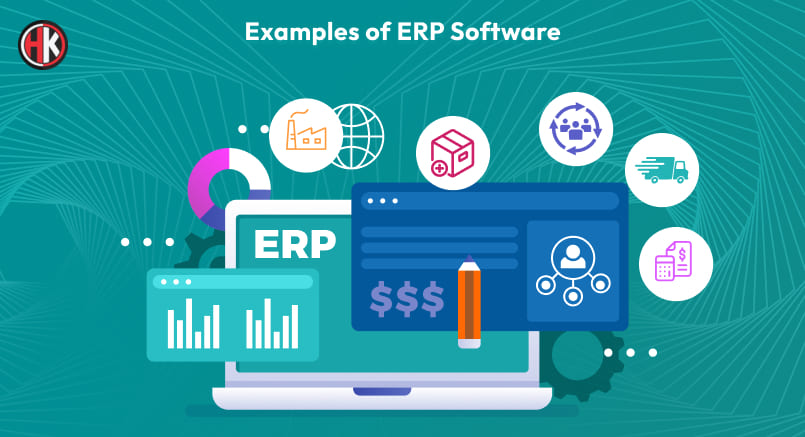
Oracle Cloud:
Our first example of ERP software is probably one you are familiar with. A variety of customers use Oracle ERP Cloud, a contemporary, dynamic piece of software that was founded in 2012. The cloud application suite uses machine learning and artificial intelligence (AI) to automate routine tasks.
Acumatica
Small and medium-sized businesses can use Acumatica. Construction, agriculture, chemicals, FMCG, distribution, manufacturing, retail, and e-commerce are just a few of the industries that Acumatica specializes in. Both on-premises and SaaS (cloud-based) deployment techniques are supported.
The system has features like document management, approval workflows, and self-service reporting. It supports data analysis using integrated Excel Spreadsheet and Power BI features. All capabilities were developed using common Microsoft tools and are completely integrated.
BizAutomation
The cloud-based software that serves as our next example of ERP software takes pride in addressing all business operations in a single platform, doing away with the need for application areas.
Small to medium-sized enterprises in the wholesale sales and service, e-commerce services, distribution, and manufacturing sectors are catered by BizAutomation.
NetSuite
Another example of ERP software on our list is NetSuite, a well-known cloud-based Enterprise Resource solution created for businesses with rapid growth and change. Oracle NetSuite is a scalable, adaptable business administration system for simplifying mission-critical procedures.
Suite Cloud developer tools offer top-notch cloud customization options that can expand the system to meet organizational needs or produce entirely new applications. Small, medium-sized, and big corporations in a range of industries use NetSuite.
Humble cow By HackerKernel
Saving the best for the last, Humble Cow is an ERP application created by Hackerkernel. We have created numerous ERPs for both new and established businesses.
Humble Cow is one of the Enterprise resource planning systems whose backend was created by our PHP developers. For the management of the company’s sales and purchase records, Humble Cow is a dairy ERP solution.
A web portal for dairy ERP which has all the features of an Android app. Simple sign-up procedure for farmers to verify product prices and receive payments without hassle. For more details, you can also visit our Humble Cow case study.
Things to Consider while Building ERP Software for Your Business:
The most important thing to do before starting the game is to familiarize yourself with the rules and regulations.
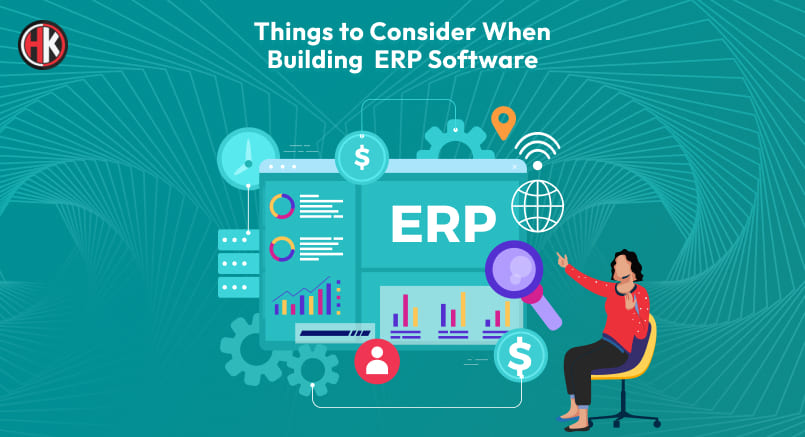
Before implementing Enterprise resource planning, you must think about the requirements of your company. Consider this:-
- What benefits do you anticipate following implementation?
- What issues are you trying to resolve?
- What tasks should the ERP complete for you, your staff, and your company?
- What is the budget that you are willing to spend on your Resource Planning software?
Conclusion
You should not ignore your company’s internal management if you want to succeed in business. A solution for this is enterprise resource planning development. A company that develops ERP software can make your daily tasks easier. Your business processes become more transparent as a result.
As an ERP development company, HackerKernel can assist you in setting up your resource management program. . Our Resource Planning systems are both affordable and of high caliber. Our developers have extensive experience integrating multiple operations into a single system.
They also ensure on-time deliveries, so you can be confident that you will profit from our Enterprise resource planning services. We offer long-term solutions for your long-term business objectives.

Husain Saify
Founder & CEO
Hey, I am Husain Saify, the Founder and CEO of Hackerkernel. I like to share some valuable information about Industry. You can also Reach Out to me On Linkedin.hello@hackerkernel.com

